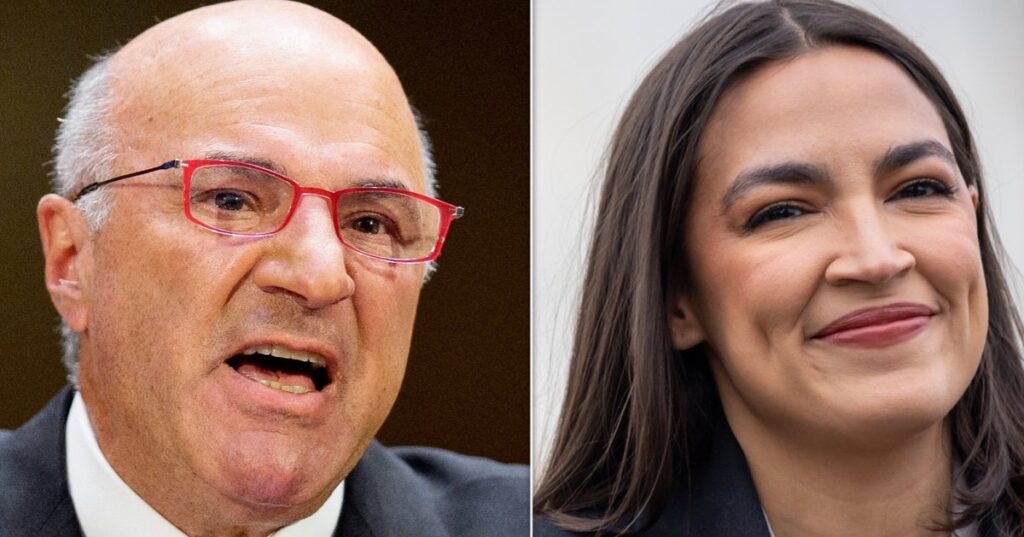“Shark Tank” investor Kevin O’Leary recently referred to Rep. Alexandria Ocasio-Cortez as “the American nightmare” during a panel discussion on CNN that was centered on the topic of the American dream.
In a Friday segment of “NewsNight,” host Abby Phillip had asked O’Leary, a vocal supporter of President Donald Trump’s policies, if the idea of Ocasio-Cortez possibly becoming the 2028 Democratic presidential nominee concerned him — considering the progressive New York congresswoman is a “populist” who speaks to issues facing working-class people.
O’Leary said that while he has a “tremendous amount of respect” for Ocasio-Cortez, the president of the U.S. has to “embody the American dream.”
“People come to America to achieve the American dream,” he said. “She embodies the American nightmare.” When pressed by Phillip to explain further, O’Leary said: “Because [Ocasio-Cortez] doesn’t believe people should succeed in wealth.”
“This is a huge problem for her,” he said about the representative who regularly speaks out against the corporate elite, the billionaire class and billionaire influence in politics.
The CNN host then argued that Ocasio-Cortez came from a “very modest background” as a former waitress and bartender, and that many would see her story as an embodiment of the American dream. But when O’Leary pushed back, saying that Ocasio-Cortez “does not support capitalism,” Phillip hit back with a crucial point: Everyone doesn’t view capitalism, or becoming extremely wealthy, as the pinnacle of the American dream.
“There are many Americans who work really hard and their aspiration is not to become supremely wealthy,” she said. “It is to have strong family units, it is to have community, it is to have a sense of purpose, it is to contribute to their environment.”
“There are many Americans for whom just being filthy rich is not the American dream,” she continued.
“I want to forgive you but you are making it hard,” O’Leary scoffed. He said earlier in the exchange that Phillip’s response “tainted the American dream.”
But Phillip’s remarks resonated with many people online. Some people on X, formerly Twitter, called O’Leary’s remarks out of touch, arguing that capitalist structures exploit working-class people, and that for many people living in the U.S., the American dream is not centered on becoming ultra-wealthy.
The Pew Research Center defines the American dream as “the idea that anyone can achieve success in the United States through hard work and determination.”
But research has shown that different demographic factors may influence whether people in the U.S. believe the American dream is achievable.
According to a Pew study conducted last year, roughly 68% of Americans aged 65 and older said they thought the American dream was still attainable, compared to 42% of people under 50 who thought so. The study also found that 64% of people who earned higher incomes felt the American dream was possible, while only 39% of lower-income Americans thought the same.
And while only 6% of Americans overall reported that they didn’t think the American dream was ever possible, the study found that Black Americans were twice as likely to respond that way than other racial groups.
Rutger Ceballos, assistant professor of political science at the University of Oregon College of Arts and Sciences, told HuffPost that he believes it seems O’Leary was “suggesting that Americanism and capitalism are inseparable ideas.”
“While there are many Americans, past and present, who I am sure would agree with him, there is also an equally prominent American tradition which is critical of concentrated wealth and economic inequality,” he said.
Ceballos, whose research explores the relationship between American political development, African American politics, and American political thought, pointed out that fears that wealth inequality would “undermine the economic and political foundations of the republic” date back as far as the Revolution.
And criticism that the “ultra-rich permeated American political rhetoric” was seen during the Civil War and Reconstruction, America’s Second Founding, he explained, adding that different periods in the U.S — including the New Deal, the Civil Rights Movement and the women’s liberation movement — all “produced their own criticisms of wealth inequality.”
“So, unless Mr. O’Leary is willing to call 250 years of American criticism of wealth inequality an ‘American nightmare,’ I suggest he reconsider his critique,” Ceballos said.
Megan Hyska, assistant professor in the department of philosophy at Northwestern University Weinberg College of Arts & Sciences, said that she believes O’Leary’s remarks cast Ocasio-Cortez’s “social democratic commitments as contrary to some historical U.S. consensus in favor of low taxation, low social spending and low regulation” — but “that consensus has never really existed.”
“The history of the U.S. labor movement, for instance, is one of working people who saw that their dream of a life of dignity, prosperity, equality and freedom was one that not only permitted but required limitations on the ability of the very wealthy to further enrich themselves on the backs of exploited labor,” she told HuffPost. “This is a dream for which many Americans have spent their life fighting.”
San Francisco Chronicle/Hearst Newspapers via Getty Images
The American dream doesn’t look the same for everyone.
Sunyee Yoon, associate professor in marketing at the University at Buffalo School of Management whose research includes social status and mobility, said that it’s important to recognize the American dream “doesn’t mean the same thing for everyone.”
“People’s experiences with opportunity and the obstacles they face can vary a lot depending on their background,” she told HuffPost, pointing out that for many immigrant families, for example, the American dream might be about “building a safer, more stable life for their family, rather than simply accumulating wealth.”
“It might mean being able to access good education, secure employment and the freedom to express their cultural identity without fear,” she said.
Yoon also said that for people from historically marginalized racial groups — who’ve experienced long-standing systemic and psychological barriers to reach “traditional markers of ‘success’” — the American dream might be more centered around achieving fair treatment and equal opportunities.
And for people who grew up in low-income communities, the American dream might mean “being able to afford college without lifelong debt or finding a stable job that provides health care,” Yoon said, adding that people from wealthier backgrounds might take these things for granted.
Ceballos emphasized that the American dream, “broadly defined as economic opportunity, class mobility and political and social freedom,” was historically inaccessible to many groups living in the U.S., including women, Black people, Indigenous people, immigrants, LGBTQ+ people and “at some points in history, impoverished working-class white men.”
For many Americans, the American dream “may have less to do with ‘success in wealth’ and more to do with basic dignity, freedom and security for them and their families,” he said.
Everyone doesn’t benefit equally from capitalist structures, experts say.
There are “valid reasons why some people criticize capitalism, especially when it comes to the treatment of working-class individuals,” Yoon said, citing instances of “unsafe working conditions and low wages” as examples.
“At the same time, capitalism has also been a driver of significant economic growth, technological innovation, and improvements in quality of life for many,” she said. “It has also enabled large numbers of people to escape from poverty, created widespread access to goods and services, and encouraged entrepreneurial efforts that have shaped modern society.”
But Yoon said that while she believes it’s important to recognize that capitalism has “created many opportunities,” not “everyone benefits equally from the system.”
“That’s why ongoing discussions about corporate social responsibility are necessary,” she said.
Ceballos said that capitalism is “a hugely complex economic, social and political system.”
“If the increase of profits is the sole metric by which capitalists judge ‘success,’ then many people, especially the workers whose labor produces the goods, risk being sacrificed at the altar of better quarterly returns,” he said.
O’Leary’s comments on CNN “reflect a familiar strategy of claiming that the dream of the wealthiest and most powerful people in this country is everyone’s dream,” Hyska said.
She continued: “This is a sleight of hand that equates the widespread dream of material security with the elite dream of unregulated wealth acquisition.”
Read the full article here








